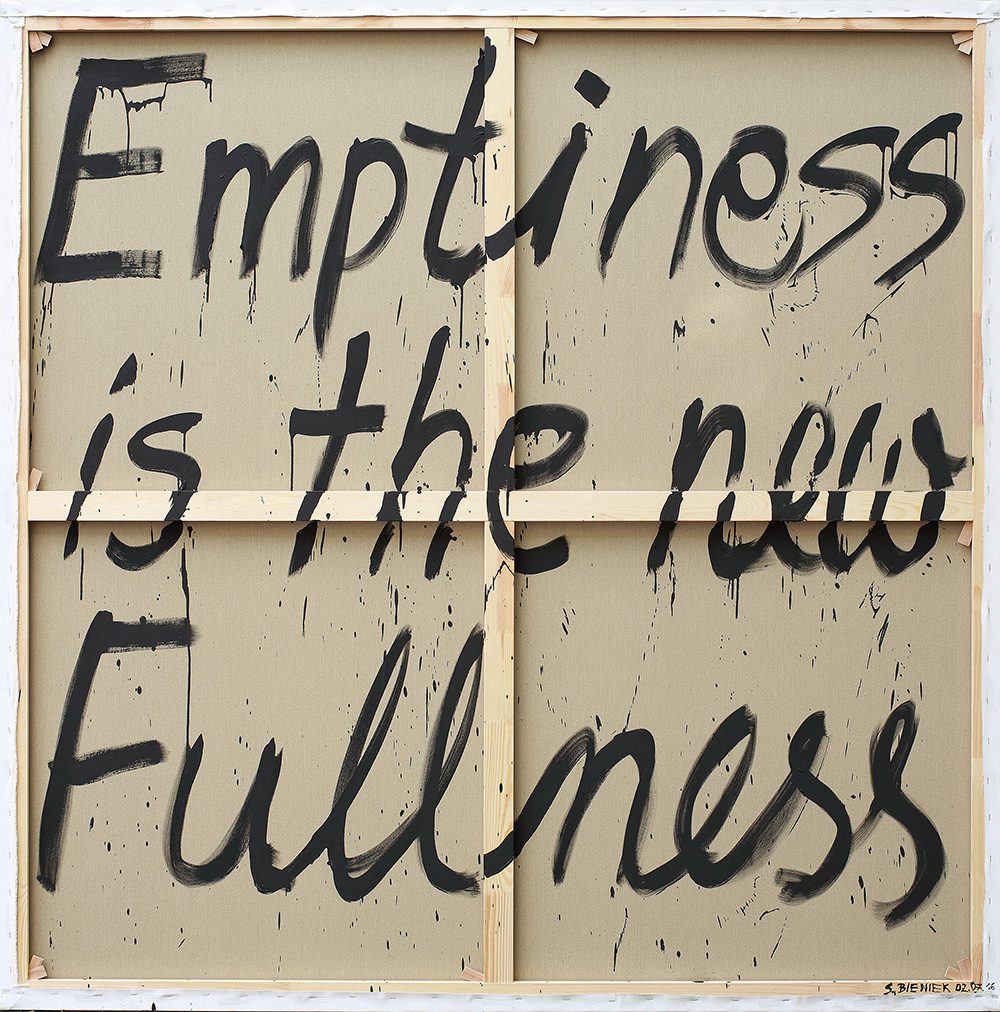
31 Oct No: What Has It to Do with Abundance?

No: What Has It to Do with Abundance? Apparently, I’m not the only one who feels “Emptiness is the new Fullness” as you see in this conceptual textart by Sebastian Bieniek, 2016 from the series “Perfect Circles.”
No: What Has It to Do with Abundance?
Last week, I had reason to send a friend these lines I have quoted to you in the past, RAISING CLARITY blog reader:
Walk around feeling like a leaf.
Know you could tumble any second.
Then decide what to do with your time.
A member of my friend’s family had died. Surprisingly.
Then I remembered how much I love this whole poem by Naomi Shihab Nye, because it is really about learning to say “no,” and why we must do it.
The final reason is the finality of our lives: we all will die. We none of us know how long we have. Yet we live as though it were rude not to allow others to waste our moments.
Learning to Say “No”
I think if you read this blog, you soon come to know that I value time far above money. I am much more forgiving of people who waste my money (I have in some way given them to waste) than I am of people who even attempt to waste my time (which I virtually never give them the chance to do anymore in the first place).
Today, I was complimented on the way I said “no” in a business meeting online via videoconference. I was asked to do something I am in charge of deciding whether to do. And I didn’t think twice about it: it was clear to me that it was wrong timing. And I love the person who asked me to reconsider my timing. So it was very easy to say “no,” very lovingly. I didn’t even notice I had done anything unusual until someone in the meeting privately sent me a note saying she had learned something from me in that meeting. She said she loved how I said no.
I had already planned to write this post but it was a blessing upon my writing.

The beauty of “emptiness”: an image from space of the Rub’ al Khali–the Arabian Empty Quarter. (Sand dunes imaged by the Advanced Spaceborne Thermal Emission and Reflection Radiometer (ASTER), aboard NASA’s Terra Earth-orbiting satellite.)
G-d in Arabic is “Allah.” There are several different word origins (etymologies) for the Name, but one I love is “The Yes and No of Existence,” offered by Neil Douglas-Klotz in his Sufi Book of Life. Al + Lah. Yes and No. Both holy. Both essential. The basic stuff and staff of Life on planet Earth.
Angels perhaps need not ever say “no.” Nor may demons need to. Only those who depend on limited and linear carrying-capacity of a body, a planet, a watershed, a power grid, a shopping cart, a gas tank, a forest, an ocean need ever worry about saying “no.” Like everyone reading this post.
Learning to Hear “No”
I once read an article quoting a mother who didn’t ever want her child to hear the word “no.” I was upset by this for years without understanding why. She thought this was a good thing, a powerful parenting improvement on being told “no” probably many times when she was a child, a girl especially.
I can imagine only a few greater disservices to a child than never to hear “no.” My no is as vital as my yes. They go together, and without my no, you have no way of knowing if my yes means anything at all. How could this girl learn to say no if she had never heard it? How could she even know what “no” felt like?
The Connection between “No” and Abundance
If you want true abundance, try “no” in some places and times that are new for you.
A soul-colleague recently sent me a beautiful card. A big part of her short letter was a story of saying “no” when “yes” was possible but “no” felt better. She didn’t need to tell me how proud she was; she just needed to share it for me to see her glowing.
Being allowed to totally sit is itself an extraordinary thing.*
This quote jumped out at me for this post from a talk given in 12th century Japan, “Everyday Activity,” by Dogen Zenji, translated by Arnold Kotler and Kazuaki Tanahashi, in my beloved dogeared copy of Moon in a Dewdrop: Writings of Zen Master Dogen, edited by Kazuaki Tanashi (NY: North Point Press/Farrar, Straus and Giroux, 1985).
I do not know another way to totally sit than to learn to say “no.” And I want that extraordinary thing.



Pingback:Time Zen - RAISING CLARITY
Posted at 04:31h, 03 February[…] I am mulling a poem. I have written to you about it before. […]
Pingback:You've Banked It Already, Now "Check" Your Privilege - RAISING CLARITY
Posted at 17:44h, 15 December[…] the web is where we live, the world of physical form, material desires, and what’s typically (though not at RAISING CLARITY) understood in such a limited way as […]